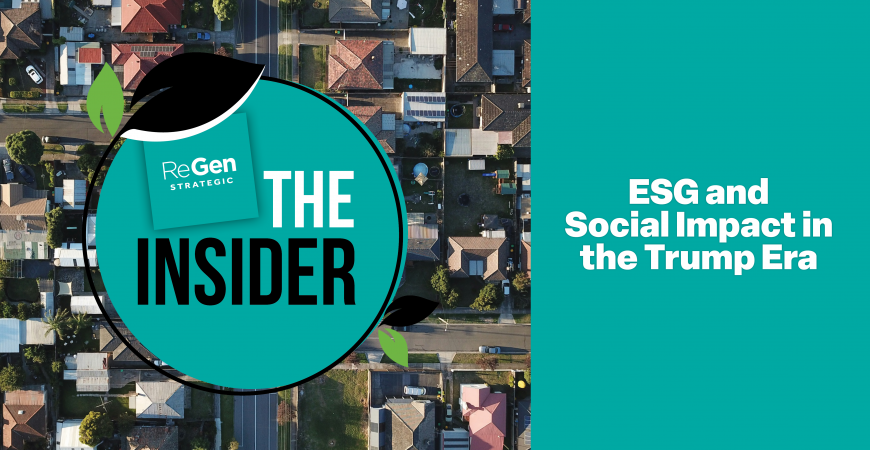In the era of Trump, it may seem like the tide is turning against progressive forces. And a series of companies are making announcements that could suggest anything ‘ESG’ is increasingly on the nose.
Witness digital behemoths Meta, Amazon, X, and now Google, all winding back their Diversity Equity and Inclusion (DEI) policies – and Google had long been an outspoken supporter of DEI targets, especially since the murder of George Floyd in 2020.
Upon his second inauguration, Trump made his opinion known in no uncertain terms by signing executive orders recognising only two sexes and scrapping DEI programs.
Of course, Trump’s now famous election catchcry ‘drill baby, drill’ wasn’t particularly encouraging for the environmental movement and renewable energy industry globally. It has been followed by executive orders declaring a ‘national energy emergency’ to “unleash a golden era of American energy dominance”.
The UK is seeing increasing community resistance to the massive investment in renewable generation and transmission required to meet the Labour Government’s push to achieve 95 per cent renewable production in just five years’ time (it is currently just over half).
In 2024, European voter backlash against the seemingly inexorable push to net zero was given a name – “greenlash”. Green parties have seen their vote decline across Europe, including the European Parliament where their numbers fell from 71 to 53.
The building of the ‘Trump Wall’ and the promised mass deportations of illegal immigrants in the US, is again echoed in Europe with the rise of far-right parties and anti-immigration forces.
Of course Australia is not immune to progressive backlash. A little over a year ago, Australians voted firmly against the PM’s referendum for a Voice to Parliament for First Nations’ people. Meanwhile, Opposition Leader Peter Dutton is advocating nuclear power as doubts about our ability to meet aggressive renewable targets continue to grow.Given this political climate, I often ponder the future of my own business – one that is firmly embedded in the disciplines of environmental sustainability, social impact and ESG. Has the concept of sustainable development – rooted in the UN’s 1987 Brundtland Report that acknowledged the need to balance economic growth with environmental stewardship and social equity – reached its zenith?
Happily, I believe best-practice ESG approaches are needed now more than ever.
The backlash against green energy, immigration, DEI, Indigenous rights, and a host of other issues will continue if we don’t bring our stakeholders with us. This means understanding our communities better – knowing what their pressure points are, what is negotiable and what isn’t.
Communities in the so-called red states – many of which border Mexico – were clearly uncomfortable with the ease that immigrants could enter the US and work in their communities. They weren’t brought on the journey. There was no social licence given.
There are several examples here in Australia of rural communities protesting transmission lines and on-shore wind farms, while off-shore windfarms have been scrapped in South Australia and moved further offshore in Western Australia due to concerns from coastal residents.
Rather than cancelling projects, there could be solutions learnt from industry – particularly the WA mining sector which has long championed the need for a ‘social licence to operate’ as a critical marker of long-term success – and one which is now driving innovation in the sector.
Proponents of mines and other development projects often conduct extensive social impact assessments to gain a deep understanding of social values and the people both inside the organisation and any impacted communities – who they are, their economic and social needs and their connection with community and place. Once known, they can then identify, assess and manage the positive and negative social impacts.
This practice requires a commitment to engagement and transparent communication with your stakeholders. Done well, it brings the community with you, and supports your organisation avoid, mitigate and manage the negative social impacts of projects, which in turn lowers strategic risks.
Finally, the most recent Climate Change Report shows 59 per cent of Australians support the transition to renewables, with only 17 per cent in opposition. Yet there remains low understanding of the progress made, with 45 per cent saying it is unlikely we will reach our emissions targets and a similar number worried about rising energy costs.
Again, there is a need for communication – to ensure the community understands just how massive the investment and change required for us to meet our goals. This means open and honest engagement with voters to report on progress, and for project proponents, it means genuine engagement with the communities that are potentially impacted.
For further information on our services to assess your social impacts, to engage and communicate with the stakeholders necessary to get your project across the line, contact the ReGen team.
 ReGen Strategic
ReGen Strategic